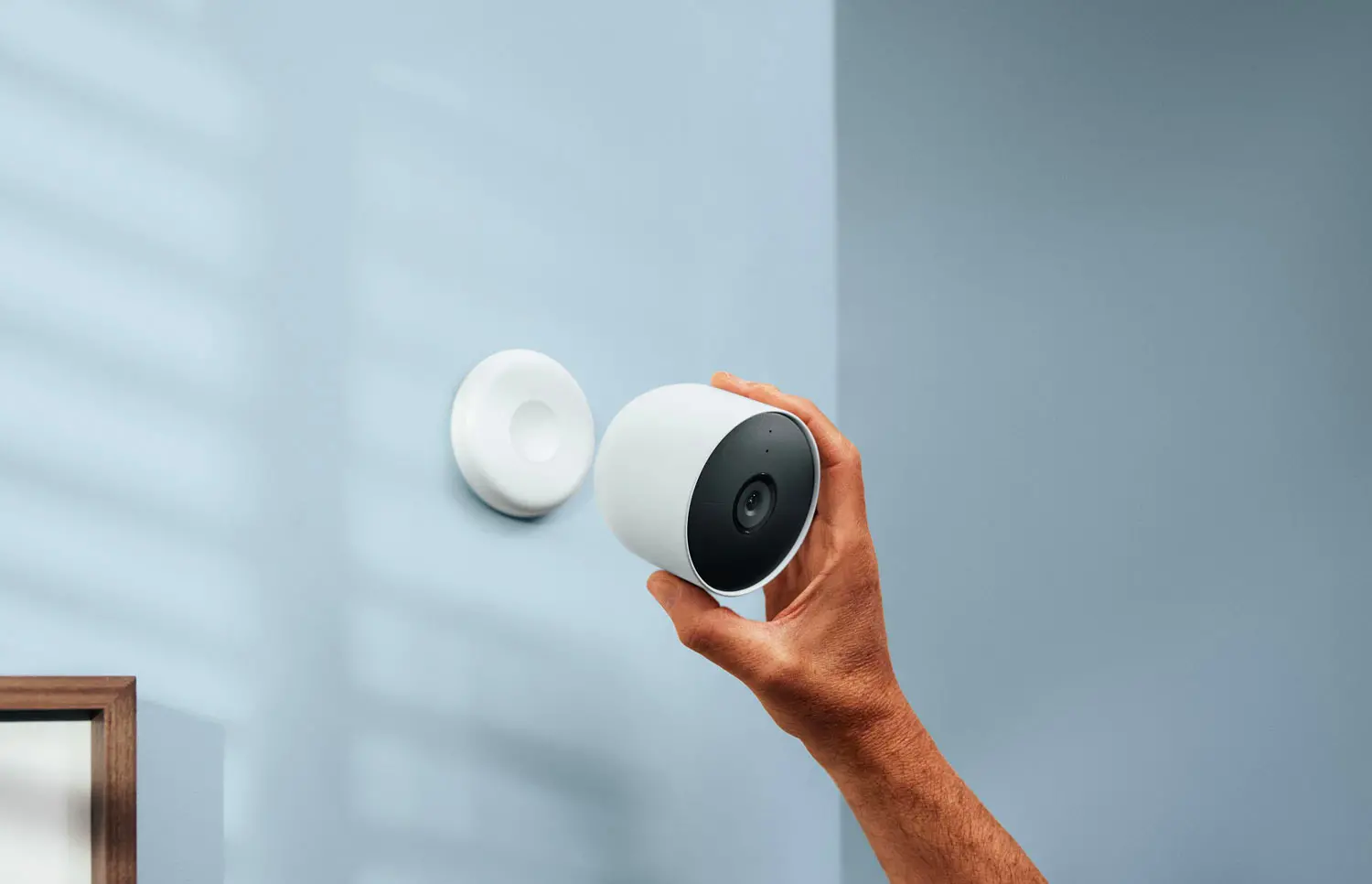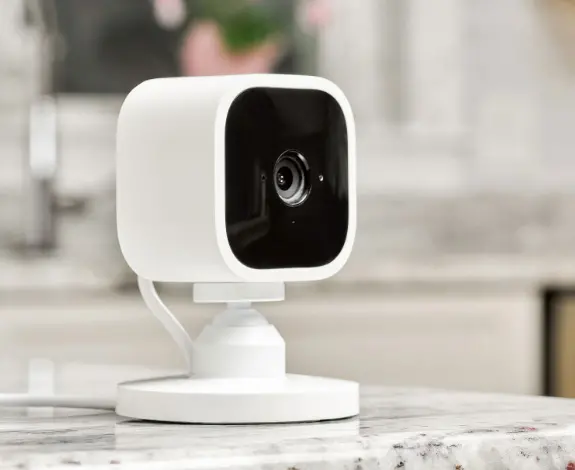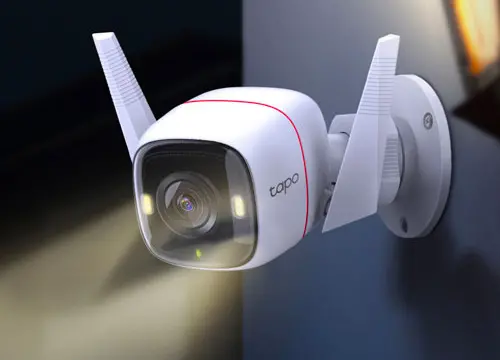
With a rise in the use of home security cameras, many homeowners are finding themselves with a myriad of questions about these devices. This guide seeks to answer the most frequently asked questions about wired and wireless, indoor and outdoor, Wi-Fi enabled, HD and night vision security cameras.
What’s the difference between a wired and wireless security camera?
A wired security camera is connected directly to a recording device or to the internet via a cable, while a wireless security camera uses a Wi-Fi network to transmit the video signal to your recording device or cloud storage. Each has its own pros and cons, with wired cameras often being more reliable but less versatile, and wireless cameras offering more flexibility but potentially less stable connectivity.
Note that both of these types of cameras usually get power from a wired connection from the camera to a power outlet or similar power source. Hence, in some cases a “wireless” camera may be identified as “semi-wireless.” A wire-free camera is usually one that is powered from either a battery or in a few cases via a solar panel.
How does a wireless security camera work?

A wireless security camera captures video and audio data and then transmits it over your Wi-Fi network. This data can be accessed and viewed in real-time using an app on your computer, tablet, or smartphone or recorded for future viewing on a variety of devices depending on the camera system you have in place.
What is the range of a typical home security camera?
The range of a security camera can vary based on whether it’s an indoor or outdoor model, but typically, an indoor camera has a range of about 30 feet, while an outdoor camera can have a range of up to 300 feet or more. The range will often depend on the resolution of the camera which can be 1080p (an HD camera), 2K, or even 4K. The better the resolution, the clearer the image will be, especially when zooming in.
Understanding home security system costs and installation
How much should I expect to pay for a home security camera system?
The cost can vary greatly depending on the type and number of cameras, brand, and whether professional installation is needed. On average, a single security camera can cost between $100 and $300, with full home security systems ranging from a few hundred to a few thousand dollars.
Can I install a security camera system myself or do I need a professional?
Many modern home security camera systems are designed for easy DIY installation. However, for complex systems, especially those involving multiple wired cameras, professional installation might be beneficial.
Exploring special features
What’s the difference between an HD security camera and a regular one?
HD security cameras provide higher resolution video than standard cameras. This means the images and videos they capture are clearer and more detailed, which can be especially useful when trying to identify faces or other specific details. For even better resolution, look for a 2K or 4K camera system.
Can home security cameras see at night?
Yes, many home security cameras come equipped with night vision capabilities. These cameras use infrared technology to capture images even in total darkness. The quality of the image can vary based on the specific camera and conditions.
Wi-Fi and smart home integration
Are Wi-Fi security cameras safe?
While no device that connects to the internet is 100% secure, most modern Wi-Fi security cameras have strong security protocols in place. It’s essential to keep your camera’s firmware updated, use strong, unique passwords, and, if possible, enable two-factor authentication.
Can I connect my security camera system with other smart home devices?
Yes, many security cameras can integrate with smart home systems, allowing you to control them along with other devices like lights, locks, and thermostats. Be sure to check that any camera you buy is compatible with your specific smart home system.
Effective Positioning and Visibility of Home Security Cameras
Where should I position my security cameras for optimal coverage?
The positioning of your security cameras is crucial for maximizing their effectiveness. High traffic areas such as front and back doors, windows, driveways, and first-floor entrances should be your first consideration. For indoor security cameras, position them in main hallways, stairways, or any valuable areas (like safes). For outdoor cameras, it’s wise to mount them high and tilted downwards for a broad field of view.
Should home security cameras be hidden or visible?

The visibility of your security cameras depends on the purpose. If you wish to deter potential intruders, visible cameras are beneficial as they can discourage burglars. A criminal who sees you have cameras, may prefer to bypass your home rather than risk getting recorded. On the other hand, hidden cameras can be more effective in recording a crime without the intruder attempting to disable them. However, there are legal and moral issues to consider: there are many areas of a home where visitors do not expect to be watched and recorded; placing a camera in those locations could be illegal. There are similar consideration for outdoor cameras: for example, you wouldn’t want your neighbour to aim their cameras at your living room or kitchen windows. In many home security systems, a mix of both visible and hidden cameras may be used for maximum effect.
How can I protect my outdoor security cameras from theft or damage?
Place your outdoor security cameras out of reach, at least nine feet above the ground, and consider protective casings to safeguard against harsh weather and vandalism. Also, some cameras come with anti-tamper and anti-theft features such as alarms that can be triggered if someone tries to manipulate the camera.
Unraveling the differences: CCTV, surveillance, security, and IP cameras
What is the difference between CCTV and security camera?
CCTV, or Closed-Circuit Television, is a type of security camera system. The term “CCTV” typically refers to an analog or digital video surveillance system that involves a set of cameras transmitting signals to a specific place on a limited set of monitors. These systems are often wired and do not broadcast their footage over the internet.
On the other hand, a “security camera” is a broader term that refers to any camera used to monitor and secure a specific area. This could include a range of devices, from traditional CCTV systems to more modern, internet-connected cameras, such as IP cameras.
What is the difference between a surveillance camera and a security camera?
The terms “surveillance camera” and “security camera” are often used interchangeably. However, a subtle difference lies in their application. Surveillance cameras are typically part of a comprehensive system designed to monitor large spaces like public areas, streets, or large retail stores. They are often used for observing and tracking activities, providing a broad overview of a location.
A security camera, on the other hand, is often used in smaller, more private settings like homes or small businesses to monitor for unusual activity and potential threats. They are more commonly associated with active security measures, such as triggering alarms or notifications when movement is detected.
What is the difference between an IP camera and a security camera?
An IP camera is a type of security camera that sends and receives data over a network or the internet, whereas the term “security camera” is a broader term encompassing various types of cameras used to monitor and secure a specific area. This can include both analog cameras (like traditional CCTV systems) and digital cameras (like IP cameras).
The advantage of IP cameras over other types of security cameras is their ability to be accessed remotely. Because they transmit data over the internet, users can view live footage from the camera from any device with internet access. This makes IP cameras a popular choice for modern home security systems.

As your living and working environments evolve, it’s more crucial than ever to ensure their security. Whether you’re considering a wireless security camera for its flexibility, a wired system for its reliability, or an indoor or outdoor camera tailored to your specific needs, it’s clear that the options are vast and varied. Understanding the features and benefits of different types of security cameras—including IP cameras—will enable you to make an informed decision, giving you peace of mind and creating a safer space.
This article was drafted using AI technology and then reviewed, fact-checked, and revised by a member of our editorial team.




